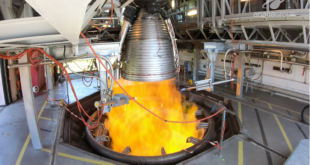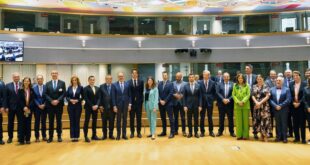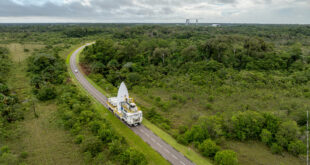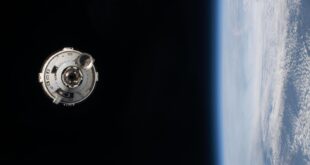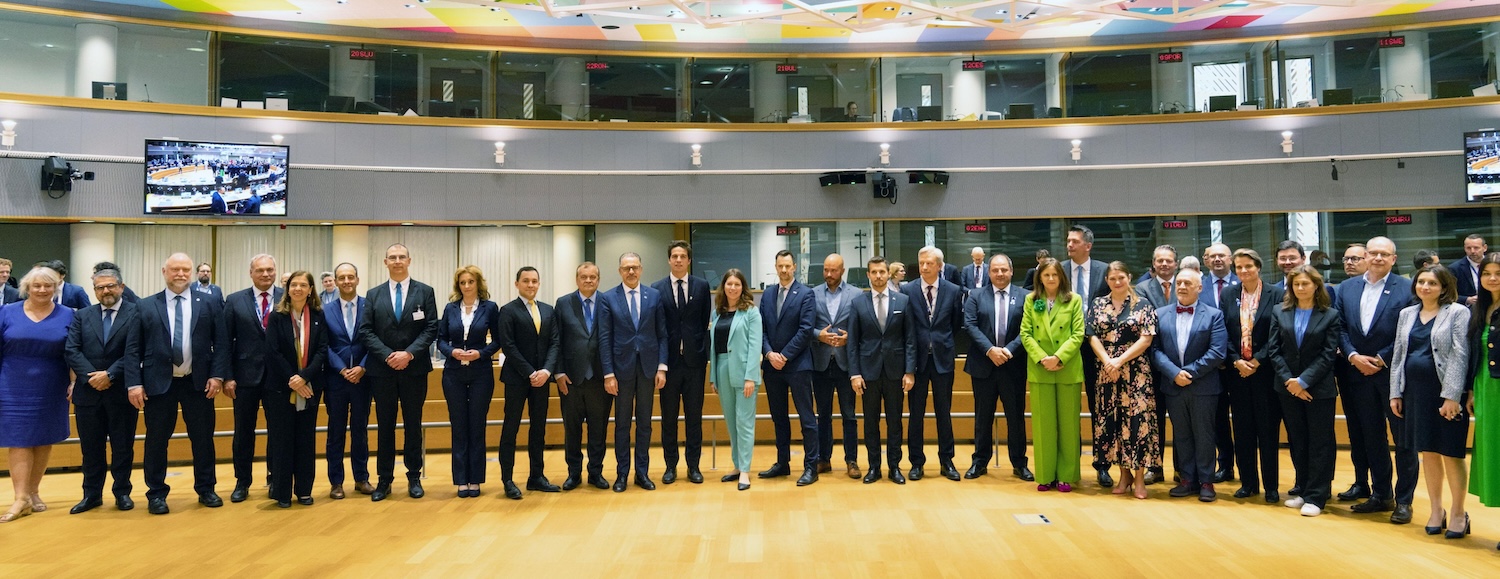
Paris, 27 May 2024. ESA held a Council at Ministerial level meeting last November in Seville and just concluded on 23 May 2024 together with the European Union a Space Council meeting in Brussels. We discussed with Kai-Uwe Schrogl, ESA’s Special Advisor for Political Affairs, where the Agency stands, where success and challenges are, and what to expect in the near future.
Torsten Kriening (TK): Prof Schrogl, what is your initial feedback on the ESA-EU Space Council 2024 in Brussels?
Kai-Uwe Schrogl (KUS): My feedback is positive. Together with the European Union and our respective Member States, we highlighted on the one hand the benefits of space technologies and applications for Europe’s overall competitiveness and on the other hand identified measures to support and increase the competitiveness of our space industry in the growing international markets. We were able to build on results from the previous Space Council, which dealt with the establishment of key principles for the global space economy. Before the Space Council we had useful consultations with all segments of the European space industrial sector in order to reflect their needs and positions in the Space Council Resolution. For ESA, the Space Council provided the opportunity to signal to the future new European Parliament and the new European Commission that such Space Councils, based on the 2004 Framework Agreement between ESA and the EU, are the format providing eye-level interaction and cooperation, which is a particular priority of our Member States. The concrete goal is to successfully align ESA’s programmes emanating from the Council meetings of 2025 and 2027 with the next EU Multiannual Financial Framework 2028-2034. This will be the point where Europe’s overall ambitions either materialize or fail.
TK: Taking a step back to Seville last November. Would you define it as a push for ESA-EU relations?
KUS: Seville was an intermediary step. The joint informal meeting of the two Councils of ESA and the EU did not lead to a formal output at that time. But Brussels did, with identical ESA Council Resolution and EU Council Conclusions. Nevertheless, Seville provided the opportunity to test the waters and highlight issues of joint action. I recall the cooperation between ESA and DG CLIMA, which received a particular impetus in Seville. For ESA, Seville was highly important for its Council meeting at the Ministerial level, which preceded the joint informal meeting of the two Councils. In our last talk, I characterized this ESA Council meeting as a game-changer. And now, half a year later, I think I can confirm this assessment. We have prepared a carefully drafted report on the implementation of the actions taken at Seville and presented this after thorough discussions with our Member States to our Ministers in Brussels. They were indeed satisfied with the rigour and the speed we have been applying to concrete action items in the fields of sustainability, space transportation, and exploration.
TK: Can we expect with the Brussels meeting concrete progress in ESA decisions now?
KUS: The Space Council issued a previously unseen comprehensive approach to raising European competitiveness through space and at the same time detailed the instruments and approaches for supporting the competitiveness of the European space industry. When listening to the livestream of the meeting and reading the Resolution, you will find a lot of important assessments of the Member States on the current situation regarding competitiveness and on expectations vis-à-vis ESA and EU to take action. Such actions have also been outlined and meticulously discussed during the past months in committees inside ESA and EU with cross-checking by the so-called Quadriga of the two Executives and the two Presidencies, Germany for ESA and Belgium for the EU. We at ESA will systematically implement the actions, such as strengthening standardisation activities, integrating space with non-space sectors, or further applying service procurement where feasible. Both Seville and Brussels will have an impact on and frame our preparation of the ESA Council at the Ministerial level in 2025, when our Member States will decide on a new package of programmes and activities as they will have an impact on the currently drafted “ESA 2040” Strategy. In a statement right after the Space Council, Eurospace took the same line in calling for concrete actions to follow and use the format of Space Councils to prepare these in the context of a comprehensive industrial policy.
TK: Following the last days’ events, I had the feeling that the political message fell behind the social and public activities. Do you agree?
KUS: I would not agree with this assessment. All activities at or around the Space Council carried a political message. I think you are referring to the public events organized the day before. Indeed, we opened the Zero Debris Charter for signature, which was done by twelve of our Member States, and we had signatures of the LEO Cargo Return Service contract and the Vigil space weather mission contract. All three were actioned in Seville and we demonstrated in Brussels the high speed with which ESA can accomplish such complex tasks. We also presented two astronauts from our new class foreseen for flight, which certainly was of interest to the public and the media. But I would also like to mention the signature of the amendment to the EU-ESA Security Agreement, where ESA took another step as an established and trusted partner for the EU and its Member States in the crucial field of space security. Lastly, the celebration of the 20th anniversary of the ESA-EU Framework Agreement, which is the basis for the Space Councils and more broadly the eye-level cooperation between these two key European space actors, is a political message of the highest quality. Our Member States are fully aware and supportive of these political messages.
TK: What challenges does ESA foresee?
Looking outside the Space Council, it is certainly the first flight of Ariane 6, which we are getting very close to. We are all excited about this. Equally, we shall see soon the first flights of the small NewSpace launchers, which we are supporting under the Boost! programme, and we will have Vega’s return to flight. With this, not only will Europe be back in space transportation, but it will be even stronger than before. We have made all efforts to ensure this happens. The same is true for IRIS2. With the latter, we face renewed questions on governance and industrial policy from Member States and we will have to take these into account while proceeding. Our main attention in the next year and a half will, however, be directed to the preparation of the ESA Council at the Ministerial level at the end of 2025. With the Member States, we are already discussing the preparation of proposals for the mandatory and optional programmes. For science, we hope for the EUCLID-effect with the sensational results that this mission is producing, which impressed our Ministers in Brussels both in view of scientific significance and of the marvellous technology enabling this. For the optional programmes, concepts with high political priority are climate action with new technological developments, for example the solar system internet, which will be the basis for Europe’s future leadership positions. We are confident to offer a comprehensive, highly attractive menu for subscriptions at that Council meeting.
TK: Europe and the world are in a very critical phase. ESA still avoids any connections to defence and military usage of space – due to its constitution. Is that still Zeitgeist or does it need a Zeitenwende (change) for ESA in terms of its approach?
It is distressing to see that there still exists the misconception that ESA cannot contribute to security. Since the early 2000s, the ESA Council has interpreted the “exclusively for peaceful purposes” clause in the Convention in a way that prevents us from building weapons, becoming a military procurement organisation, or committing aggressive acts. Nevertheless, we can provide our capabilities and capacities with the consent of our Member States and under these red lines for security purposes. For example, under an agreement with the European Defence Agency or in technology developments such as the Public Regulated Service of Galileo, we have been doing this for decades already. The signature of the amendment to the EU-ESA Security Agreement, which I just mentioned, is only the latest building block in this respect. We have Member States, like Poland, who urgently want us to be more active in the field of security and resilience. But we also have Member States which are reluctant to task us since they already have capacities of their own. We meticulously balance these interests. But we also see that European citizens, and Members of Parliament in our Member States with whom I regularly talk, cannot understand why there is an institution such as ESA, which could contribute to Europe’s security in these critical times, but is prevented from doing that even under carefully drawn limitations.
TK: We expected the draft of the EU Space Law in mid-March, but it was postponed. Postponing in light of the EU Elections in June feels like a very long postponement. How would you assess the situation?
KUS: I cannot assess the reasons for the postponement since these are internal to the Commission. But it might turn out to be a wise decision to take a step back, to reorient the discussion and to provide in the next steps a transparent frame. Since the potential scope of the legislation was not entirely clear during the past months, Member States have become uneasy with the consequences they could face, in view of their existing legislations, space or non-space. They particularly fear legislation, which might protect our space activities well, but at the same time might benefit only some segments of the European space industry and even build a “fortress Europe”, hindering commercial activities or excluding actors and essential institutions. With the Zero Debris Charter, developed jointly with the governmental as well as non-governmental actors, we intend to provide useful and attractive technical solutions for space sustainability, demonstrating that the Agency wants to be a model organisation by applying this Charter and provide European industry with solutions for space sustainability in synergy with future European space legislation. In a broader sense, if Europe can come up with legislation as it did for data protection or artificial intelligence, then it can also extend its nickname as a “regulatory superpower” to space, with positive internal and external effects. In this respect, it would certainly also help, if the EU would declare acceptance of the Liability and the Registration Conventions, as ESA or Eumetsat did already decades ago. This would establish the EU as a responsible actor on the international level and would support Europe’s ambition to develop new global norms and rules for Space Traffic Management.
TK: What is Europe’s role as an international space actor, especially in light of the Russian-Ukrainian conflict?
KUS: Space cooperation certainly follows political trends and settings. ESA continues and even intensifies traditional partnerships with the US and Japan, but it also develops new ones with other space powers and emerging space nations. For example, we invited the Chairman of ISRO, the Indian space agency, to address the Council. This not only impressed our delegations given India’s capabilities, but also initiated reflections on the efforts we must take in order not to fall back – something you might call the cost of inaction. In my opinion, we should invest much more in Africa. ESA and even more so Eumetsat are already active there. The continent develops its own indigenous capabilities from which we can learn and be inspired. A much deeper and mature partnership can provide broad mutual opportunities for key issues of joint concern such as climate change. Turning to the broader level of what is today called “space diplomacy”, our Member States are continuously active. I just want to mention the highly successful process of preparing the input dedicated to space to the UN Summit for the Future, led by Portugal, which assembled more than 50 countries in Lisbon two weeks ago. In general, Europe’s role as a principled and normative actor, stressing the rule of law and the character of space as a global common and acting accordingly in its programmes and its diplomacy is as powerful as ever. No aggressor state, no billionaire shall be above the law as long as Europe stands to its principles.
TK: In the next week the European Space sector will gather in Berlin at the ILA Airshow. What can our audience expect from ESA?
KUS: ILA is a fantastic opportunity to present the public value – political, economic, societal – of our activities. We will have certainly a lot of interactions with industry, but also with Member States institutions, civilian and security-related, and also parliamentarians. The open days will provide thousands of citizens, particularly young people, with the opportunity to visit our joint pavilion. While we will look back to Seville and Brussels, the key direction will be our Council at the Ministerial level end of 2025, which will take place in Germany. I should also mention that next year ESA will celebrate the 50th anniversary of the signature of its Convention. This Convention was mentioned before in one of my answers, and I, therefore, take this opportunity to recall that it is not 50 years old, but rather 50 years young. It it allows ESA to do two things: the first is to work on a solid basis of multilaterally agreed European integration of space activities of its Member States with rules and mechanisms providing them with the best possible means to build competitive industrial capacities according to their priorities. The second one is that ESA can, under the Convention’s roof, easily adapt to changing environments and requirements as the decisions of Seville demonstrate. 50 years young and ready for the next 50 years.

Kai-Uwe Schrogl is the Special Advisor for Political Affairs at the European Space Agency (ESA). He had been responsible for the preparation and coordination of the Space Summit of November 2023 in Seville, including the preparation of the Director General’s Proposal to the ESA Council at Ministerial level (see here). Now, he was preparing together with the Cabinet services the 11th ESA-EU Space Council, backed by his experience of organising the last, 10th Space Council of November 2020, while seconded to the German Ministry for Economic Affairs and Energy under the German EU Council Presidency (see here).


